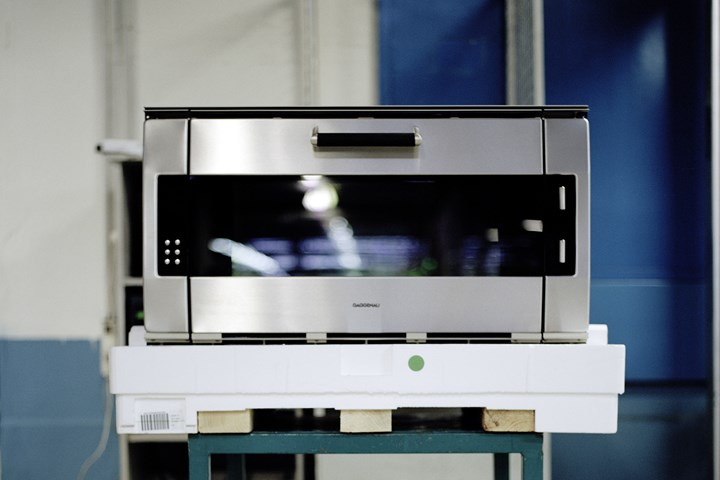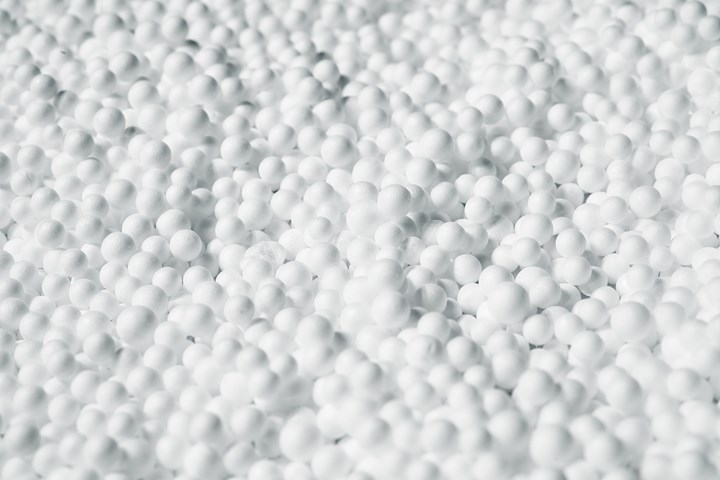Chemically Recycled EPS Adopted by Leading European Home Appliance Manufacturer
BSH Hausgeräte to use chemically recycled EPS bead from BASF for ‘luxury’ line of dishwashers
Leading European home appliance manufacturer BSH Hausgeräte GmbH is adopting for the first time BASF’s Styropor EPS bead based on a raw material made from chemically recycled plastic waste as a packaging material for selected large appliances of its brand Gaggenau—one of eleven household appliance brands of the BSH Group, which serves the luxury segment. Due to its manufacturing process, Styropor Ccycled EPS reportedly has the same properties as conventional Styropor, maintaing the key packaging properties such as excellent impact absorption and high compressive strength, which are essential for the protection of sophisticated home appliances.
BSH is initially testing the new Styropor Ccycled EPS foam packaging made from recycled material at its production site in Dillingen, Germany. The ambitious objective is to use this type of resource-efficient packaging for all large appliances worldwide.

Said BSH Hausgeräte COO Silke Maurer, “By using Styropor packaging, for which the raw materials come from chemical recycling, we are actively contributing to our sustainability goals and the industrywide circular economy. We are delighted to have BASF, a long-standing, experienced partner, at our side, helping us to achieve these goals.”
In the production of the packaging foams that have become so well-known over the last 70 years, pyrolysis oil has merely replaced fossil raw materials. BASF’s partners extract this oil from plastic waste that would otherwise be used for energy recovery or go to landfill. BASF then uses the required amount of oil to manufacture new plastics at the start of the value chain. Since recycled and fossil raw materials are mixed in production and cannot be distinguished from each other, the recycled portion is allocated to Styropor Ccycled EPS bead using a mass balance approach. Both the allocation process and the product itself have been certified by Ecoloop, an independent certification program.
Compared with conventional Styropor, at least 50% of CO2 is saved in the production of Styropor Ccycled packaging. Said Klaus Ries, head of BASF’s European styrenics business, “Current environmental policy focuses on reducing greenhouse gas emissions, conserving fossil resources, and avoiding or using waste. By using products from our ChemCycling project, our partner BSH is actively contributing to the recovery of plastics after their use phase and feeding them back into the materials loop.”

In the future, BASF and BSH plan to strengthen their cooperation by examining the use of alternative raw materials along additional value chains and finding solutions to close the plastics loop in these areas. This includes undertaking further recycling processes into consideration. As uncontaminated Styropor packaging waste can be mechanically recycled extremely well, this type of recycling is already used widely today and will be stepped up further over coming years.
Related Content
-
Understanding the ‘Science’ of Color
And as with all sciences, there are fundamentals that must be considered to do color right. Here’s a helpful start.
-
The Effects of Temperature
The polymers we work with follow the same principles as the body: the hotter the environment becomes, the less performance we can expect.
-
How to Optimize Injection Molding of PHA and PHA/PLA Blends
Here are processing guidelines aimed at both getting the PHA resin into the process without degrading it, and reducing residence time at melt temperatures.















